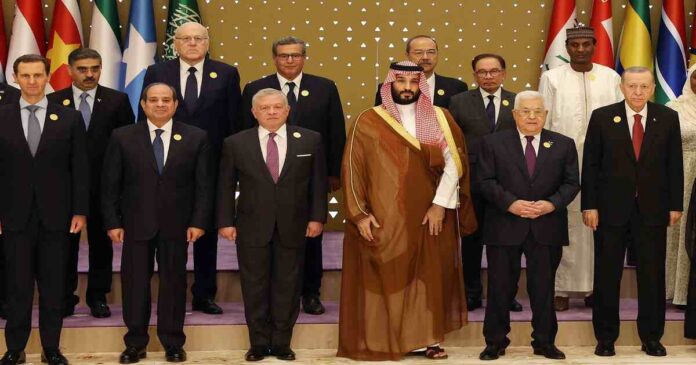Islamic-Arab summit: Muslim countries reject proposal to cut ties with Israel. Once perceived as a staunch Islamic leader of the Muslim world, now being a staunch supporter of Israel has played a stronghold in turning down the resolution moved in the Islamic-Arab summit.
Details and Background of the Proposal:
This proposal was introduced and offered by Algeria, which consisted of sanctions such as denying Arab airspace to Israeli flights and explore the use of oil as this step could be utilized to leverage a ceasefire in Gaza.
Among others who rejected this move were the UAE, Jordan, Egypt, Bahrain, Sudan, Morocco, Mauritania, and Djibouti. There was no detailed minutes report of this Summit though, which has now led to a barrage of confusion and an open field for speculations.
Saudi Arabia’s Position of Leadership
Rejecting the plan is in line with Saudi Arabia’s historical role as a stabilizing influence in the region. Speaking during the summit, Crown Prince Mohammed bin Salman demanded an immediate ceasefire and held Israel accountable for the “crimes committed against the Palestinian people.” The Kingdom’s emphasis on finding a diplomatic solution to the problem demonstrates its dedication to maintaining regional stability.
Iran’s Engagement and Unprecedented Connections
The first-ever state visit by an Iranian head of state to Saudi Arabia occurred during the conference, making history. This event transpires around eight months subsequent to China mediating a ceasefire between the two nations. Aware of the changing dynamics in the Middle East, Iranian President Ebrahim Raisi called for Islamic nations to label the Israeli military as a “terrorist organization.”
Turkey’s Request for Harmony
In order to resolve the Israel-Palestine dispute permanently, Turkish President Recep Tayyip Erdogan—a strong supporter of Palestinian rights—emphasized the necessity of holding an international peace conference. Erdogan’s demand for an end to hostilities permanently and his claim that Gaza needs more than brief reprieves highlight how urgent it is to handle the humanitarian situation.
Read More: IslamKolleg: First Imams Complete German Training
World’s Liability:
The president of Indonesia, the most populous Muslim nation in the world, Joko Widodo, called the Organization of Islamic Cooperation (OIC) to take all appropriate action to hold Israel responsible for the alleged humanitarian catastrophes. In light of the ongoing crisis, Indonesia’s firm stance represents the need for justice and accountability around the world.
The complex geopolitical factors surrounding the Israel-Palestine conflict were revealed at the Islamic-Arab conference in Riyadh.
The suggestion to cut diplomatic ties with Israel was rejected, and Saudi Arabia’s leadership position highlights the delicate balance that needs to be struck between diplomatic pragmatism and regional stability. The story of this protracted battle is being shaped by the changing relationships and diplomatic strategies within the Muslim world, while the world observes. Although there is still uncertainty about the way to a long-term solution, the summit has prepared the ground for further discussions and diplomatic initiatives.
Also Read: China-Central Asia Summit: Will be a milestone for building closer relations


